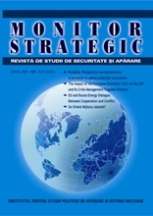Poziționarea Republicii Populare Chineze față de recursul la forța militară (intervenții armate internaționale) în timpul și după terminarea Războiului Rece: elemente politice, strategice și de securitate
The Attitude of the People’s Republic of China Regarding the use of Military Force (International Armed Interventions) During and After the Cold War: Political, Strategic and Security Elements
Author(s): Şerban Filip CioculescuSubject(s): Human Rights and Humanitarian Law, Security and defense, Military policy, Welfare systems, Peace and Conflict Studies, Russian Aggression against Ukraine
Published by: Editura Militară
Keywords: China; military interventions; war; United Nations; pacifism; hegemony; aggression; humanitarian interventions; Russia; conflicts;
Summary/Abstract: It is well-known that the People’s Republic of China’s attitude towards the military interventions by other states and organization on the territory of third states has been traditionally guided by the rules of the UN Charter and that it only accepted military interventions with self-defensive purposes, collective security actions with a clear mandate given by the UNSC, while rejecting ab initio unilateral armed interventions without a proper UNSC mandate. PRC is strongly opposed especially to military actions that results into interference in the domestic affairs of other sovereign states. Also, Beijing has made a tradition of not recognizing territorial annexations resulting from the use of military force, nor the emergence of new states as a result of illegal military interventions by other states or organizations. Thus, it did not recognize the temporary annexation of Kuwait to Iraq (1990), later it did not recognize Kosovo, nor Abkhazia and South Ossetia as independent states. But in the recent years, as Sino-American rivalry become stronger and the western states (the NATO and EU members) began to gradually limit China’s trading and technological freedom on their territories, Beijing turned to Russian Federation and they created a strategic partnership against Western values and strategic aims. Therefore, PRC became much more tolerant with Moscow’s aggressive behavior and refrained from condemning Russian attack on Ukraine. The Chinese propaganda but also the scientific experts prefer to blame USA (and NATO as such) for having isolated and frustrated Russia, while avoiding to name Russia as a genuine aggressor in international law. Thus, China seems to gradually moving away from its strict adherence to the UN Charter’s norm restricting the use of force in international relations.
Journal: Monitor Strategic
- Issue Year: 2023
- Issue No: 1-2
- Page Range: 59-75
- Page Count: 17
- Language: Romanian

